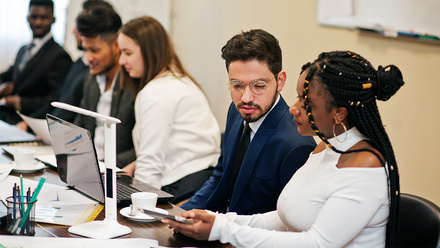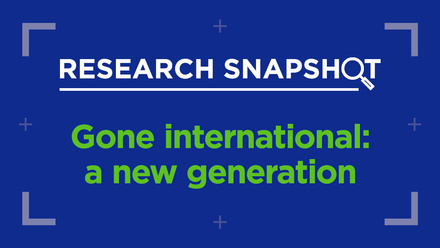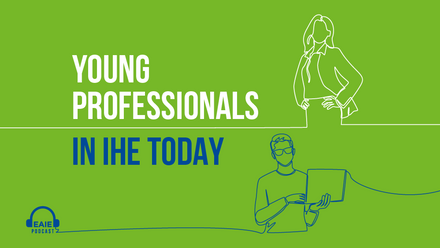Developing unexpected skills with international internships

Finishing off Forum week and our exploration of ‘unexpected internationalisation’ on the blog, we take a look at international internships. While work placements abroad are traditionally linked to gains in intercultural communication and social skills, they can also lead to unexpected outcomes in other areas.
Ask educators what skills students gain from an international experience and most will cite social and interpersonal skills. What if they were wrong? What if international experiences enhance cognitive skills more than social skills? Our research found exactly that.
International experience matters for employers but only if graduates can transform skills into behaviours that are observable and translatable into value-adding workplace performance. Unexpectedly, our research finds that an international experience translates into behaviours involving the highest order cognitive skills (eg quick thinking, learning agility and creative insight).
Measuring the value of mobility
The benefits of mobility on employability are still only partly understood by universities, employers and even students, and often include discrepant perspectives. In fact, Trooboff, Vande Berg and Rayman’s seminal paper finds that human resource professionals and non-senior management place significant value on studying abroad. Yet these findings were significantly influenced by a positive disposition, in that over 15% of the respondents had studied abroad themselves. While the benefits of mobility on employability may not be entirely understood, it is known that among the different types of study abroad experiences, employers show a strong preference for international internships.
International internships helped graduates to master higher order cognitive skills specifically related to enhanced learning.
Discrepant findings regarding the value of international experiences on employability could be due to research methodologies used in the field. Often, when conducting research on employers and academics, surveys are used. Surveys have their problems, and here are just two crucial cognitive biases that influence survey responding: the self-serving bias and social desirability bias. The self-serving bias is any thought, behaviour or feeling that is distorted by the need to view oneself favourably, while the social desirability bias is where, again, any thoughts, behaviours or feelings are distorted by the need to be viewed by others favourably. These cognitive biases can significantly influence self-reports in general, and specifically for questions about employability. The issue is that graduates need to feel confident that they can make an impact, that what they do is indeed important, and that past actions – like international experiences – are part of that process.
Game-based analytics can help us to move beyond the problems associated with self-reporting, and help us look at hidden processes related to employability. The KNACK is just one of those game-based talent analytics that has been found to reliably predict workplace performance in terms of a range of cognitive abilities, personality traits, emotional and social abilities, mindsets and aptitudes. A player’s micro-behaviours – for example, the position and timing of cursor movements, and actionable clicks – are logged at the millisecond level. From this data, behavioural markers are generated that represent higher-level psychological constructs like creative thinking or growth mindset. The United States Agency for Youth Development placed the KNACK in the top 4% of the 244 measurement tools analysed in terms of predictive performance.
Game-based analytics allow us to gain insight into the hidden behaviours associated with those skills that employers value most.
Hidden potential for employability
We used the KNACK to help us better understand the influence of international internships on employability. Interestingly, we found that international internships helped graduates to master higher order cognitive skills specifically related to enhanced learning, ie quick thinking, learning agility and creative insight, which are related to the highest cognitive domain in Bloom’s taxonomy and are exactly what employers seem to value the most. These skills are not typically regarded as the obvious outcome of an international internship. Instead, skills relating to self image, such as self confidence and social skills linked to effective team working, are often cited as those that can be positively impacted by this kind of experience.
More could be done to actively simulate international workplace environments in virtual classrooms.
Game-based analytics allows us to gain insight into the hidden behaviours associated with those skills that employers value most and offer us an opportunity to think more creatively about employability skills development through internationalisation. Our current research goes a step further by demonstrating behaviours that have not been typically found to be the expected outcome of international experiences, ie higher order cognitive skills.
We are excited at the prospect of the next phase of our research, learning more about how behaviours that constitute employability are defined, and how and why international work experiences can influence those skills deemed most valuable to employers. There are also interesting prospects for internationalisation at home. Although collaborative online international learning is involved in an increasing number of programmes, more could be done to actively simulate international workplace environments in virtual classrooms. This would enable educators to offer such experiences to the entirety of the student body, not just the mobile minority. Designing ‘international’ internship activities into curricula at home could present unexpected and exciting potential.






